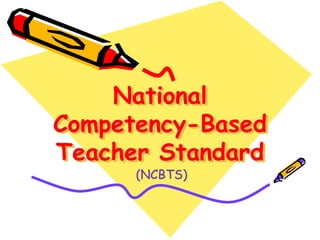NCBTS
•Als PPTX, PDF herunterladen•
8 gefällt mir•5,940 views
The National Competency-Based Teacher Standards (NCBTS) is a framework that defines the competencies, behaviors, attitudes, and skills that teachers in the Philippines should possess. The NCBTS outlines seven domains that represent key aspects of effective teaching and learning: 1) social regard for learning, 2) learning environment, 3) diversity of learners, 4) curriculum, 5) planning, assessing, and reporting, 6) community linkages, and 7) personal growth and professional development. Each domain incorporates performance standards and indicators that provide observable measures for quality teaching performance.
Melden
Teilen
Melden
Teilen

Empfohlen
Empfohlen
Weitere ähnliche Inhalte
Was ist angesagt?
Was ist angesagt? (20)
Syllabus fs1 learner's d evelopment and environment sy2011-12

Syllabus fs1 learner's d evelopment and environment sy2011-12
National Competency-based teacher standards (NCBTS)

National Competency-based teacher standards (NCBTS)
N.C.B.T.S.-National Competency-Based Teacher's Standard (2013)

N.C.B.T.S.-National Competency-Based Teacher's Standard (2013)
Field Study 2 Episode 2 Lesson Objectives As My Guiding Star

Field Study 2 Episode 2 Lesson Objectives As My Guiding Star
NCBTS (National Competency-Based Teacher Standards)

NCBTS (National Competency-Based Teacher Standards)
National competency based teacher standards (ncbts)

National competency based teacher standards (ncbts)
The Demands Of Society From The Teacher As A Person

The Demands Of Society From The Teacher As A Person
Andere mochten auch
Continuous Learning for HR Enrichment through MOOC’s – A Global Perspective in Indian ContextContinuous Learning for HR Enrichment through MOOC’s – A Global Perspective ...

Continuous Learning for HR Enrichment through MOOC’s – A Global Perspective ...RUDRA BUSINESS SOLUTIONS
Andere mochten auch (20)
National Competency-Based Teacher Standards (NCBTS)

National Competency-Based Teacher Standards (NCBTS)
National Competency - Based Teacher Standards (NCBTS) Orientation

National Competency - Based Teacher Standards (NCBTS) Orientation
Code of Ethics for Professional Teachers of the Philippines

Code of Ethics for Professional Teachers of the Philippines
The Teacher In the Classroom & In the Community: Part 1

The Teacher In the Classroom & In the Community: Part 1
Detailed Lesson Plan (ENGLISH, MATH, SCIENCE, FILIPINO)

Detailed Lesson Plan (ENGLISH, MATH, SCIENCE, FILIPINO)
classroom management review and facets of understanding

classroom management review and facets of understanding
Proposal for Re-evangelization of the Philippines by Frank Padilla

Proposal for Re-evangelization of the Philippines by Frank Padilla
Continuous Learning for HR Enrichment through MOOC’s – A Global Perspective ...

Continuous Learning for HR Enrichment through MOOC’s – A Global Perspective ...
Ähnlich wie NCBTS
Ähnlich wie NCBTS (20)
The national competency based for teachers standards (ncbts)

The national competency based for teachers standards (ncbts)
Providing effective teaching; the development of technology in language learning

Providing effective teaching; the development of technology in language learning
Module 4_VEX_PHILIPPINE PROFESSIONAL STANDARDS FOR TEACHERS

Module 4_VEX_PHILIPPINE PROFESSIONAL STANDARDS FOR TEACHERS
Differentiating Instruction Through The Implementation of UDL

Differentiating Instruction Through The Implementation of UDL
M.Ed Teacher Education's Topic-Use of Sign System, Category System, Portfolio...

M.Ed Teacher Education's Topic-Use of Sign System, Category System, Portfolio...
NCBTS
- 1. National Competency-Based Teacher Standard (NCBTS)
- 2. The National Competency- Based Teacher Standards • The NCBTS is a set of competencies (behavior, attitudes and skills) that each teacher much possess to function effectively and satisfactorily. • These are based upon “ the core values of Filipino teachers and on the principles of effective teaching and learning.
- 3. • The NCBTS framework is divided into seven (7) domain that represent the desired features of the teaching and learning process. These domain incorporate a series of twenty-one (21) strands of desired teaching performance statements which can be identified as eighty (80) performance indicators that observable indicators of quality performance. • (Experiential Learning Courses Handbook, 2009)
- 5. Domain 1. Social Regards for Learning • Focuses on the ideal that the teacher serve as positive and powerful role models of the values of the pursuit of learning of different kinds of the effort to learn. • The teacher’s actions, statements, and different types of social interaction with students exemplify this ideal.
- 6. Domain 2. Learning Environment • Focuses on importance of providing for a social, psychological and physical environment within which all students, regardless of their individual differences in learning, can engage the different learning activities and work towards attaining high standards of learning.
- 7. Domain 3. Diversity of Learners • Emphasizes the idea that the teachers can facilitate the learning process in diverse learners by first recognizing and respecting individual differences, then using knowledge about student’s differences to design diverse sets of learning activities to ensure that all students can attain desired learning goals.
- 8. Domain 4. Curriculum • Refers to all elements of the teaching-learning process that work in convergence to help the students understand the curricular goals and objectives, and to attain high standards of learning defined in the curriculum.
- 9. Domain 5. Planning, Assessing & Reporting • Refers to the alignment of assessment and planning activities. • In particular, these domain focuses on the: 1. use of assessment data to plan and revise teaching-learning plans 2. the integration of assessment procedures in the plan and implementation of teaching-learning activities . 3. reporting on learner’s actual achievement and behavior.
- 10. Domain 6. Community Linkages • Focuses on the ideal that classroom activities are meaningfully linked to the experiences and aspirations of the students in their homes and communities. • Thus the domain focuses on teacher efforts directed at strengthening the links between schools and communities, particularly as these links help in attainment of the curricular goals.
- 11. Domain 7. Personal Growth & Professional Development • Emphasize the ideal that teachers value having a high personal regard for teaching profession, concern for professional development, and continuous improvement as teachers.
